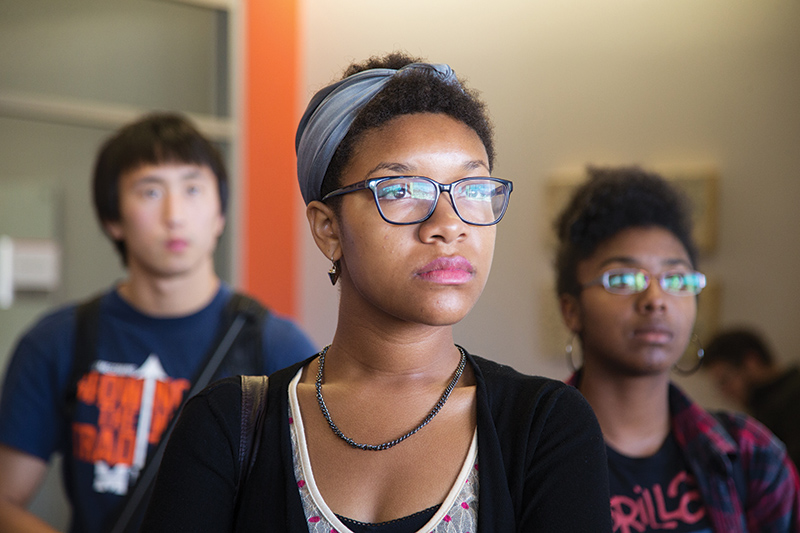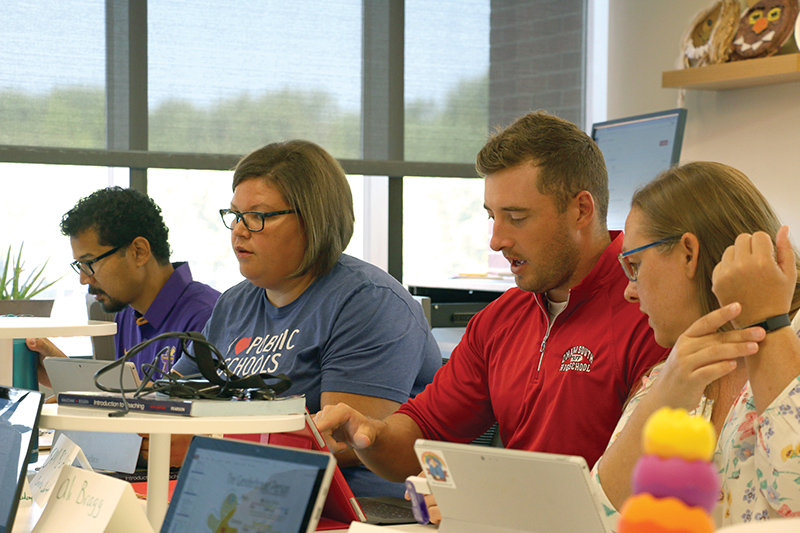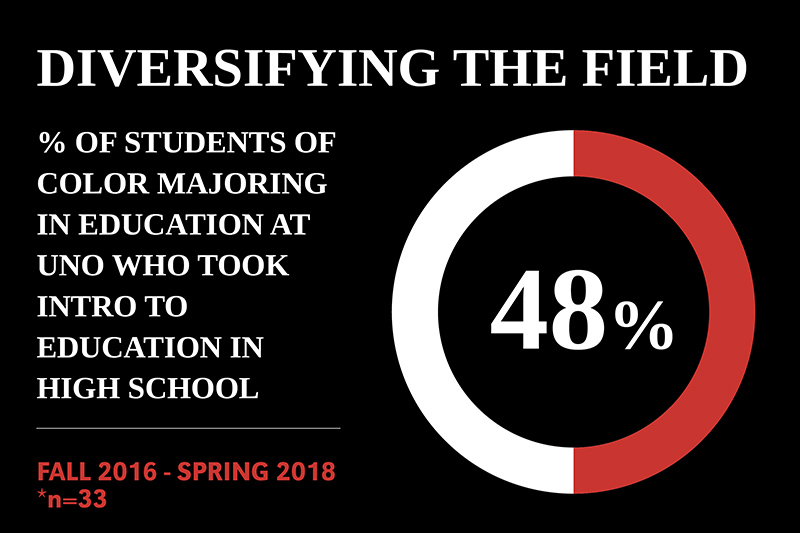Dual Enrollment Creates a Strong Pathway for Aspiring Teachers
- contact: College of Education
- email: unocoe@unomaha.edu

In the College of Education, a partnership between the Teacher Education Department (TED), the UNO Dual Enrollment Program, and several Omaha high schools is creating a strong, quality pathway to UNO for high schoolers who aspire to be teachers.
This partnership is known as the TED Dual Enrollment Model, and it began in 2014 during a workshop between UNO Teacher Education faculty and Omaha-area high school educators. They collaborated to intentionally revise curriculum for the career-focused, dual enrollment course Introduction to Education, which high schoolers can take for UNO credit.
Introduction to Education is the dual enrollment version of Educational Foundations, the first core class for a pre-education student in the College of Education.
"Before that first workshop, the high school programs had their own spin on the content and assessments of their school-based courses," explains Assistant Professor of Teacher Education Dr. Kelly Gomez Johnson, who served as a Dual Enrollment Liaison from 2014-2018.
"To offer dual enrollment credit, we needed to make sure key learning outcomes matched for our courses, whether they were being taken in a high school setting or UNO classroom. Now that all of our programs and courses are aligned, students earn credit for a TED course, rather than purely an elective credit. It's a win-win. Students do not need to re-take a course they took in high school, and we are gaining extremely dedicated and passionate future educators from the start."
Partnerships have risen 62.5% since the curriculum was aligned. Eight high schools offered the course in 2014, increasing to 13 schools in 2018.

During her four years as liaison, Dr. Gomez Johnson worked with teachers in the summer and visited classrooms during the school year. "Recruiting from dual enrollment is the goal," she says. "By building strong relationships with high school teachers and students, they see UNO as the best and most supportive place to become a teacher."
"Our goal is to prepare the best teachers we can while tapping into the potential of the entire city. We have so many different types of students across Omaha, and UNO is trying to diversify the teachers who are in front of those kids. We're trying to engage future teachers who look like, come from the neighborhoods, and have similar upbringings as kids in front of them."
Sam Bojanski, a dual enrollment teacher at Omaha South High Magnet School, describes the impact this partnership has on the lives of his students, "Currently, Omaha South has more students attending UNO than any other high school and that is by no accident."
Dual enrollment has helped push our students to attend college with confidence. It has both motivated students to attend UNO and eased some fears of what a college course demands.
"Over 60% of South's student body will be the first generation to graduate high school in their family. Because the majority of our students do not have college experience in their family, offering a college atmosphere in South's dual enrollment classes has helped push our students—80% of whom are Hispanic—to attend college with confidence. It has both motivated students to attend UNO and eased some fears of what a college course demands."
The numbers are promising, showing that students of color are enrolling in the COE teacher education programs using dual enrollment as a pathway.
Between Fall 2016 and Spring 2018, 52 out of the 225 Intro to Education high school participants went on to attend UNO after graduation, and 63% of those students funneled directly into the teacher education program. Almost half of those 33 aspiring educators identified as people of color, and 58% were first-generation college students.

Dual enrollment creates a stronger pathway to college for high schoolers and helps with college success. According to recent research by the Community College Research Center (CCRC), students in dual enrollment programs are more likely to attend college than their non-participating peers, and they enter with a defined academic path. They also have higher GPAs and show greater retention. Benefits are most pronounced for students in career-focused courses and for typically underserved students.
A 2017 study by the Nebraska Department of Education found that students who earn credit in dual enrollment classes "have better odds of going on to college compared to those who do not earn dual credit."
They don't look around and say to themselves, 'I don't belong here,' instead, they say, 'I have something to contribute, and I can impact my future students. I am needed here.'
Students from dual enrollment programs also bring a special perspective to the Teacher Education program. Dr. Gomez Johnson explains, "As we talk about topics such as culturally responsive teaching in class, students who come from these dual enrollment programs bring in real experiences because they have worked in real internships already. It enriches the entire class."
"It is a particularly empowering experience for first-generation college students," continues Dr. Gomez Johnson, who was a first-generation college student herself.
"They now come in a step ahead of their peers with classroom experiences from a teacher's perspective. They come in with confidence, being able to apply their prior experiences to new theories or strategies they are learning in college coursework."
"They don't look around and say to themselves, 'I don't belong here,' instead, they say, 'I have something to contribute, and I can impact my future students. I am needed here.' It's affirming, and I have seen students persevere because they have had these experiences."